Unit2 Grammar
人教版高中英语必修2 Unit2 Grammar 优秀学案
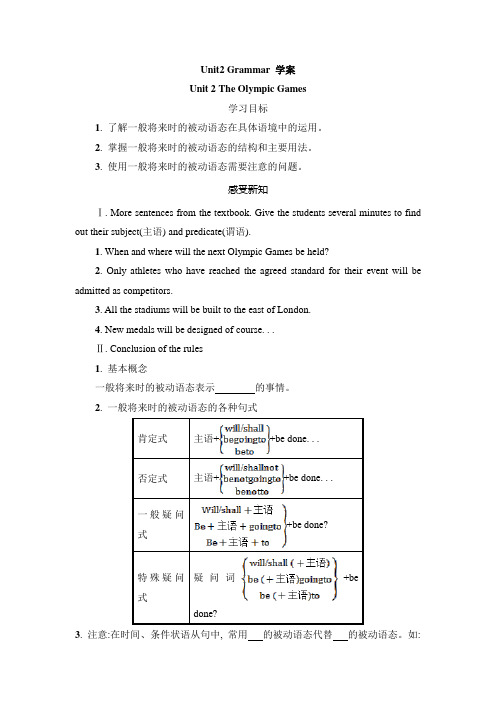
Unit2 Grammar 学案Unit 2The Olympic Games学习目标1. 了解一般将来时的被动语态在具体语境中的运用。
2. 掌握一般将来时的被动语态的结构和主要用法。
3. 使用一般将来时的被动语态需要注意的问题。
感受新知Ⅰ. More sentences from the textbook. Give the students several minutes to find out their subject(主语) and predicate(谓语).1. When and where will the next Olympic Games be held?2. Only athletes who have reached the agreed standard for their event will be admitted as competitors.3. All the stadiums will be built to the east of London.4. New medals will be designed of course. . .Ⅱ. Conclusion of the rules1. 基本概念一般将来时的被动语态表示的事情。
2. 一般将来时的被动语态的各种句式++be done. . .++be done?3. 注意:在时间、条件状语从句中, 常用的被动语态代替的被动语态。
如:When the dam is completed, the river will be controlled.大坝竣工后, 这条河的河水将得到控制。
Ⅲ. Consolidation1. Fill in the blanks with the right form of the given words.(1)We (not punish) if we break the rule.(2)The exam (not put off).(3)His new novel (publish) next week.(4)The sports meet (hold) on April 10th.(5)The problem (discuss)at tomorrow’s meeting.2. Translate the sentences into English.(1)这些旧建筑什么时候被拆除?(2)我不会因为自己的错误而受到父亲的惩罚。
Unit 2 Grammar 牛津译林版英语九年级上册讲义 (含答案)
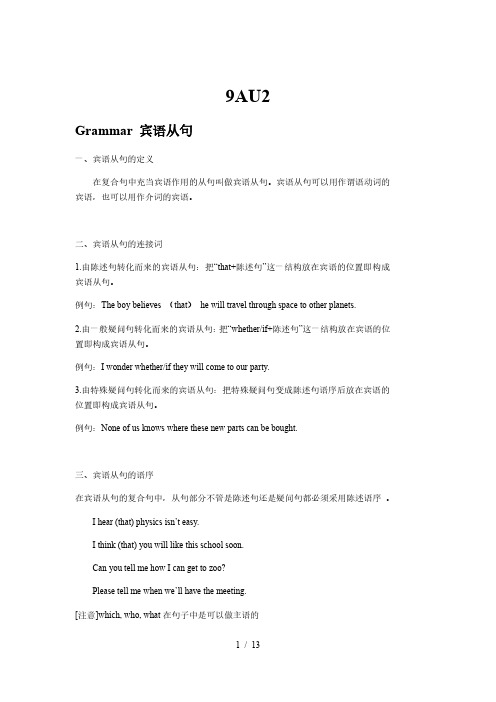
9AU2Grammar 宾语从句一、宾语从句的定义在复合句中充当宾语作用的从句叫做宾语从句。
宾语从句可以用作谓语动词的宾语,也可以用作介词的宾语。
二、宾语从句的连接词1.由陈述句转化而来的宾语从句:把“that+陈述句”这一结构放在宾语的位置即构成宾语从句。
例句:The boy believes (that)he will travel through space to other planets.2.由一般疑问句转化而来的宾语从句:把“whether/if+陈述句”这一结构放在宾语的位置即构成宾语从句。
例句:I wonder whether/if they will come to our party.3.由特殊疑问句转化而来的宾语从句:把特殊疑问句变成陈述句语序后放在宾语的位置即构成宾语从句。
例句:None of us knows where these new parts can be bought.三、宾语从句的语序在宾语从句的复合句中,从句部分不管是陈述句还是疑问句都必须采用陈述语序。
I hear (that) physics isn’t easy.I think (that) you will like this school soon.Can you tell me how I can get to zoo?Please tell me when we’ll have the meeting.[注意]which, who, what在句子中是可以做主语的I wonder who is Tom’s English teacher.I don’t know what can be avoided.四、宾语从句的时态1. 如果主句的时态是一般现在时,宾语从句该用什么时态就用什么时态。
I don’t think (that) you are right.Please tell us where he is.Can you tell me how I can get to the railway station?2. 如果主句的时态是一般过去时,宾语从句只能用相应的过去时态(一般过去时,过去进行时,过去将来时,过去完成时)。
unit2 grammar动名词做主语和宾语
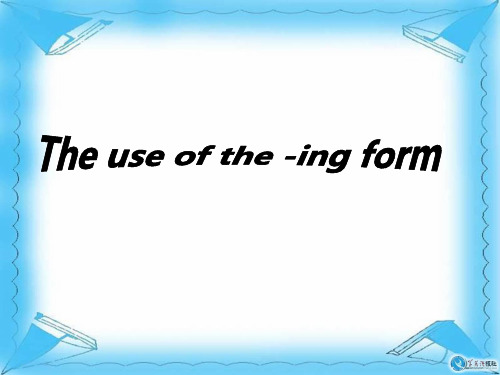
• 我们不知道要去哪儿。 我们不知道要去哪儿。 • There was no knowing where we would go. • 做这件傻事毫无意义。 做这件傻事毫无意义。 • There is no point doing such a silly thing.
动名词与不定式做主语时的比较:
1.作主语
动名词作主语时,句子有两种形式: 动名词作主语时,句子有两种形式: ①动名词直接置于句首主语的位置 上。
作主语
1)吸烟会致癌。 吸烟会致癌。 吸烟会致癌 Smoking may cause cancer. 2)说比做容易。 说比做容易。 说比做容易 Talking is easier than doing. 3)眼见为实 眼见为实 • Seeing is believing.
非谓语动词
• • • • • 非谓语动词包括 to do ; v-ing; v-ed V-ing可以做主语,宾语,表语, 可以做主语, 可以做主语 宾语,表语, 定语,宾补, 定语,宾补,状语
• Seeing is believing. • I like playing basketball. • Don’t leave me waiting outside in the rain
我并不想叫你生气。 我并不想叫你生气。 • I didn’t mean to make you angry. . • 帮助他人意味着帮助自己 • To help otehrs measns helping yourself.
E·go on doing 和go on to do
• • • • • • go on doing继续做一直在做的事; 继续做一直在做的事; 继续做一直在做的事 go on to do接着做另一件事。如: 接着做另一件事。 接着做另一件事 请接着做这同一个练习。 请接着做这同一个练习。 Please go on doing the same exercise. . 请做另外一个练习。 请做另外一个练习。 Please go on to do the other exercise. .
Unit 2 Grammar课件初中英语七年级下册(牛津译林版)

help mother do some housework cook dinner for buy her a present/ flower... write a letter/ postcard to her study hard ...
Post-task
一、用正确的时态填空
will
1. Women’ Day is coming.aIm__g_o_i_n_g__t_o_g_i_v_e___ (give) my mother a present.
2. -- What _a_r_e_ you ___g_o_i_n_g__t_o_b__e_ (be) when you
We shall/ will have classes tomorrow.
Will you have classes tomorrow?
Yes, I(we) will / shall.
后天
Will you have classes the day after tomorrow?
No, I (we) wiwllonno’t / shashllanno’t. t t
3W.We e aren’t gnooitndgotooudro outrohnoigmhte=wthoirsk
tonight/this evheonminegw. ork evening
4T.hTehtwe itnwin brontohteprlsayaren’tngeoxitnTguetosdpalyay
Sum up(总结) the time expressions in the simple future tense.
将来时的典型标志:
Unit2Grammar课件牛津译林版九年级英语上册
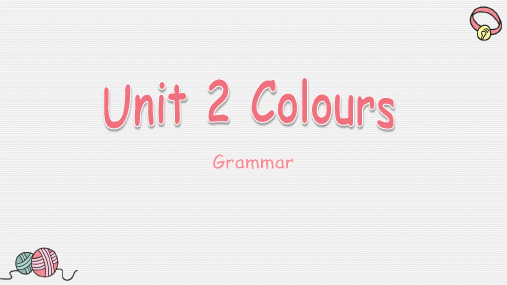
二、宾语从句的语序
三、宾语从句的时态
1. 当主句是一般现在时,宾语从句的时态不作限制,我们可以根 据句子的需要使用任何一种时态。(需要性原则)
I hear (that)
Jim __w_a_s___ (be) a worker two years ago. Jim __i_s___ (be) an English teacher now. Jim __w_i_ll__co_o_k___ (cook) dinner tomorrow. Jim __is_s_i_n_g_in__g__ (sing) a popular song now. Jim __h__a_s _b_e_e_n__ (be) to the Great Wall twice. Jim __w_a_s__p_la_y_i_n_g__ (play) basketball when his father came back.
一、宾语从句的连接词(引导词)
1. 当宾语从句是陈述句时(包括肯定句和否定句),要用连接词 that引导。that在句中没有词义,不充当任何句子成分,因此在 口语或非正式文体中常常被省略。
e.g. I’m think (that) blue is better than pink. “I’m feeling blue” means (that) “I’m feeling sad”.
一、宾语从句的连接词(引导词)
3. 当宾语从句是特殊疑问句时,连接词用疑问句中的疑问词,同时 把原来的疑问语序改为陈述语序。此时宾语从句常可用“疑问词+to do”的结构替换。
e.g. He asked how they would go to the park. = He asked how to go to the park. I don’t know what I should do next. = I don’t know what to do next.
译林版英语九年级上册_【同步练习】Unit_2_Grammar(解析版)
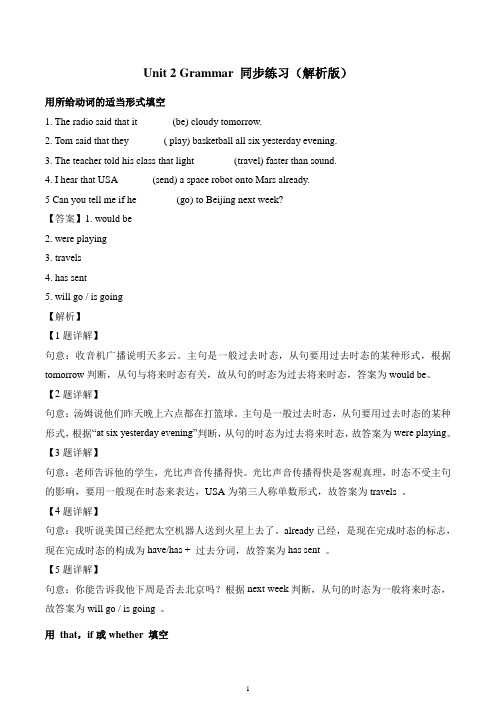
Unit 2 Grammar 同步练习(解析版)用所给动词的适当形式填空1. The radio said that it ______ (be) cloudy tomorrow.2. Tom said that they ______ ( play) basketball all six yesterday evening.3. The teacher told his class that light _______ (travel) faster than sound.4. I hear that USA ______ (send) a space robot onto Mars already.5 Can you tell me if he _______ (go) to Beijing next week?【答案】1. would be2. were playing3. travels4. has sent5. will go / is going【解析】【1题详解】句意:收音机广播说明天多云。
主句是一般过去时态,从句要用过去时态的某种形式,根据tomorrow判断,从句与将来时态有关,故从句的时态为过去将来时态,答案为would be。
【2题详解】句意:汤姆说他们昨天晚上六点都在打篮球。
主句是一般过去时态,从句要用过去时态的某种形式,根据“at six yesterday evening”判断,从句的时态为过去将来时态,故答案为were playing。
【3题详解】句意:老师告诉他的学生,光比声音传播得快。
光比声音传播得快是客观真理,时态不受主句的影响,要用一般现在时态来表达,USA为第三人称单数形式,故答案为travels 。
【4题详解】句意:我听说美国已经把太空机器人送到火星上去了。
already已经,是现在完成时态的标志,现在完成时态的构成为have/has + 过去分词,故答案为has sent 。
Unit2Grammar课件牛津译林版英语八年级上册
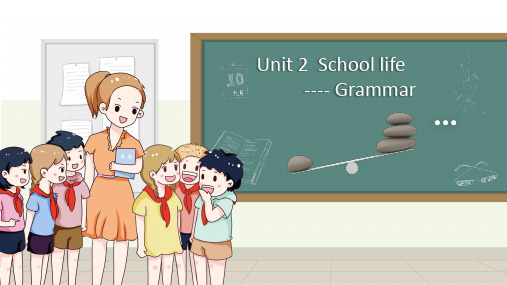
Irregular replace the adverbs word
replace the word
well badly far
better
best
worse
worst
further/father furthest/farthest
Have a try
fast ____f_a_s_te_r____ ____f_a_st_e_s_t____ early ____e_a_rl_i_er____ ___e_a_r_l_ie_s_t____ well ____b_e_t_te_r____ _____b_e_s_t_____ close _____c_lo_s_e_r___ _____c_lo_s_e_s_t ___ slowly __m__o_r_e_s_lo_w__ly_ __m__o_st__sl_o_w_l_y__ badly ____w_o_r_s_e____ ____w__o_rs_t_____ far fa_r_t_h_e_r_/f_u_r_t_h_e_r fa_r_th__es_t_/f_u_r_t_h_e_s_t quickly _m_o_r_e__q_u_ic_k_l_y __m__o_st_q__u_ic_k_l_y_
可数名词
Have a try Make sentences with “has more/fewer … than…”
Betty
Tom
sticker s
sweets
pens
Part A Comparing the amount of things
李思颖
spent 1 hour enjoying the moon
Mr. Liu
Mr. Liu bought the most snacks among the three.
Unit 2 Grammar 基础知识及练习 2021-2022学年牛津译林版九年级英语下册
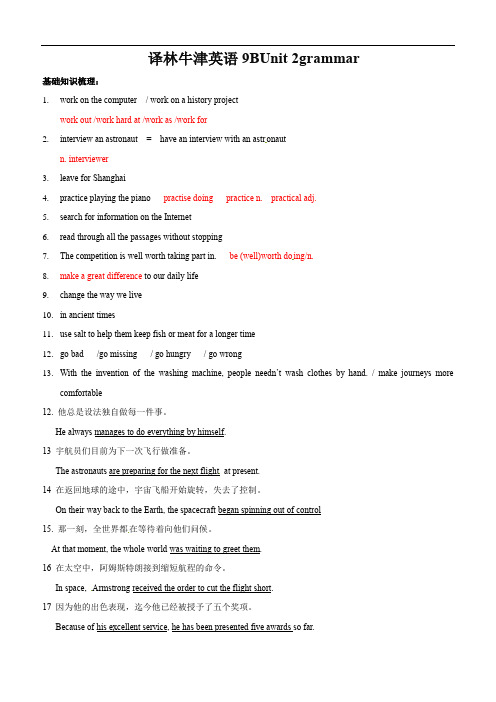
译林牛津英语9BUnit 2grammar基础知识梳理:1.work on the computer / work on a history projectwork out /work hard at /work as /work for2.interview an astronaut = have an interview with an astr onautn. interviewer3.leave for Shanghai4.practice playing the piano practise doing practice n. practical adj.5.search for information on the Internet6.read through all the passages without stopping7.The competition is well worth taking part in. be (well)worth do ing/n.8.make a great difference to our daily life9.change the way we live10.in ancient timese salt to help them keep fish or meat for a longer time12.go bad /go missing / go hungry / go wrong13.With the invention of the washing machine, people needn’t wash clothes by hand. / make journeys morecomfortable12. 他总是设法独自做每一件事。
He always manages to do everything by himself.13 宇航员们目前为下一次飞行做准备。
八上英语课件 Unit2 Grammar 课件
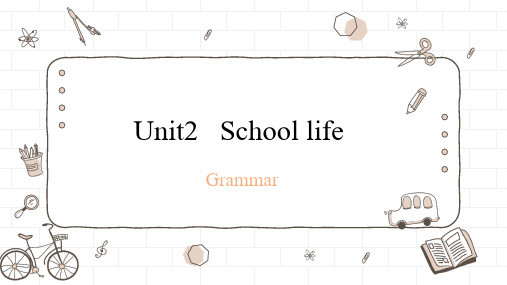
Millie has more tomatoes than Daniel. Millie has less juice than Daniel. Millie has fewer bananas than kitty.
Kitty has the most eggs. Daniel has the fewest tomatoes. Millie has the least juice.
hardest highest earliest
大部分双音节词 quickly more quickly most quickly 和多音节词前加 carefully more carefully most carefully
more , most
不规则变化
well badly
better worse
Comparing the amount of things
We can compare the amount of things using more...than, fewer...than and less...than. We use the most for the largest amount and the fewest / the least for the smallest amount.
language points
four
1.Free time each day 每天的空闲时间free做形容词,意为“空闲的,业余的”。Friday afternoons are
left free for revision.星期五下午的时间留出来复习。【拓展】free做形容词,还可意为“有空的,自
Unit2 School life
Grammar
七年级上册英语Unit2 Grammar知识点总结及练习-译林版(含答案)

Unit 2 Let’s play sports!Grammar随堂小练习I.用所给动词的适当形式填空。
1. Simon’s cousin _______(look) tall and slim.2. Millie________ (have)an MP3 player.3. My cousin, Tony________(not do) his homework in the evening.4. What about ________(go) swimming this afternoon.5. Let Sandy _________(help) you with your English.【KEYS】I.1. looks2. has3. doesn’t do4. going5. help第一部分讲解分析一、新词的导学与解读1.weekend【用法】n.周末,【举例】What are your plans for the weekend?你周末计划做什么?【拓展】weekend的意思是“周末”,指星期六、星期日两整天,weekday可数名词,意为“工作日”,“在工作/上学日”翻译成“on weekdays”【实践】翻译句子。
我正在考虑在何处度周末。
_____________________________________.【点译】I was wondering where to spend the weekend.2. at weekends/ at the weekends/ on weekends on the weekends【用法】在周末;at weekends“每逢周末,在周末”,at/on weekends = at/on the weekend ,西方的人们把星期天看成是一个星期的第一天,所以weekend指的是Friday和Saturday。
但在国内,weekend指的多半还是Saturday和Sunday。
八上 unit 2 grammar
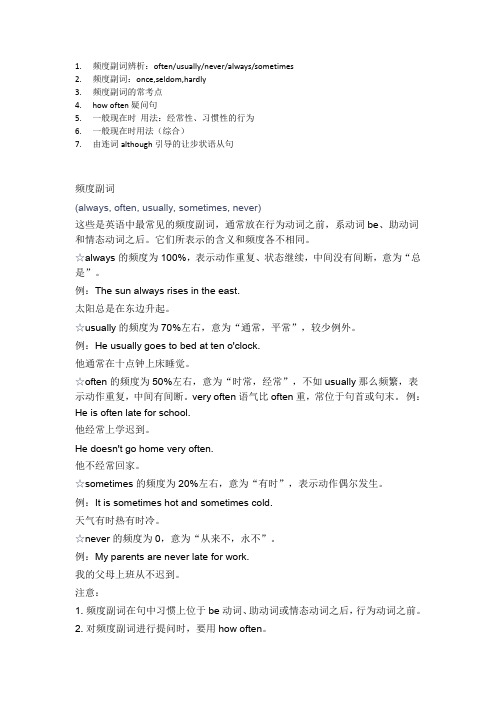
1.频度副词辨析:often/usually/never/always/sometimes2.频度副词:once,seldom,hardly3.频度副词的常考点4.how often疑问句5.一般现在时用法:经常性、习惯性的行为6.一般现在时用法(综合)7.由连词although引导的让步状语从句频度副词(always, often, usually, sometimes, never)这些是英语中最常见的频度副词,通常放在行为动词之前,系动词be、助动词和情态动词之后。
它们所表示的含义和频度各不相同。
☆always 的频度为100%,表示动作重复、状态继续,中间没有间断,意为“总是”。
例:The sun always rises in the east.太阳总是在东边升起。
☆usually的频度为70%左右,意为“通常,平常”,较少例外。
例:He usually goes to bed at ten o'clock.他通常在十点钟上床睡觉。
☆often的频度为50%左右,意为“时常,经常”,不如usually那么频繁,表示动作重复,中间有间断。
very often语气比often重,常位于句首或句末。
例:He is often late for school.他经常上学迟到。
He doesn't go home very often.他不经常回家。
☆sometimes的频度为20%左右,意为“有时”,表示动作偶尔发生。
例:It is sometimes hot and sometimes cold.天气有时热有时冷。
☆never的频度为0,意为“从来不,永不”。
例:My parents are never late for work.我的父母上班从不迟到。
注意:1. 频度副词在句中习惯上位于be动词、助动词或情态动词之后,行为动词之前。
2. 对频度副词进行提问时,要用how often。
译林版九年级下册英语Unit 2 Grammar知识点总结

Unit 2 Great peopleGrammar1. Many modern inventions have made a great difference in our life. They have changed the way we live.(1) 词组make a difference to的含义:有作用,有关系,有影响。
【注意】make a difference to的变体: make no(some,etc) difference to没有(有些)作用,关系,影响。
如: The rain didn't make much difference to the game.这场雨对比赛没多大影响。
Changing schools made a big difference to my life.转学对我的一生有着重大影响。
(1)第二处划线部分的结构:way是先行词, we live是个定语从句,修饰way,含义为“我们生活的方式”。
练习:(1) Does it make any _______ whether they will win the match or not this afternoon?A. differenceB.timeC. wayD. sense(2)没有他,会影响你的工作吗?(注: absence的含义为“缺席”)Will his absence ___________________________________________ your work?解析:1-2 A make a difference to2. Fresh food would go bad in summer in a few hours. In the past, people washed their clothes by hand.(1) “系表结构” go bad的含义:(食物等)变酸,变坏,变质。
Unit 2 Grammar语法 指示代词,人称代词和who引导的特殊疑问句-2024-2025学年
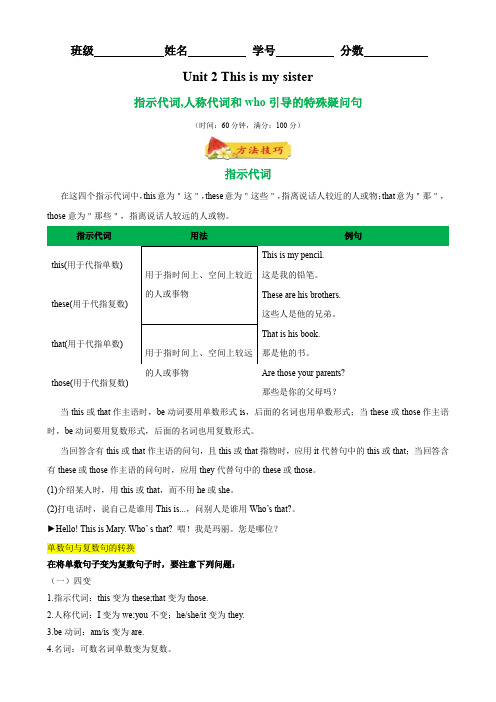
A.HeB.HerC.His
35.—Who is singing over there?
—_______ is Sandy’s sister.
A.SheB.HerC.HersD.It
36.______ is Li Ping’s brother.
A.SheB.HeC.HisD.Her
Whocan dance?(作主语)谁会跳舞?
主语谓语
Whodoeshelove?(作宾语)他喜欢谁?
宾语主语谓语
一、单项选择(本大题共50小题,每小题2分,共100分)
1.—Is this a nice school?
—__________.
A.Yes, there isB.No, it isn’tC.Yes, this isD.No, it is
班级姓名学号分数
Unit2 This is my sister
指示代词,人称代词和who引导的特殊疑问句
(时间:60分钟,满分:100分)
指示代词
在这四个指示代词中,this意为"这",these意为"这些",指离说话人较近的人或物;that意为"那",those意为"那些",指离说话人较远的人或物。
A.TheseB.TheyC.ThoseD.This
11.—Is this your school, Peter?
—________.
A.Yes, this isB.Yes, it isC.No, this isn’tD.No, it is
12.—Is this ________ tape player?
6.—Is this your father?
—___________.
译林版八年级下册英语Unit 2 Grammar知识点总结

Unit 2 TravellingGrammar重点全解1. Kitty and her family have gone to Hong Kong.family作可数名词,意为“家,家庭,家人”。
其复数形式要变y为i,再加-es,即families。
family(单数)His family is big. 他的家庭是一个大家庭。
family(复数)His family all like reading. 他们全家人都喜欢读书。
注意family是集合名词,作主语时,若指家庭这个集体,则谓语动词用单数形式;指家庭成员时,被视为复数,谓语动词要用复数形式。
2. Suzy is not at home at the moment.at the moment为介词短语,相当于now,意为“此刻;现在”,用于一般现在时或现在进行时的句子中,作时间状语,其中moment为可数名词,意为“瞬间;片刻”。
例如:I have nothing to do at the moment. 现在我无事可做。
We are watching a movie at the moment. 此刻我们正在看电影。
【拓展】at that moment意为“在那时候”,用于一般过去时或过去进行时。
The girl was washing her clothes at that moment. 在那时候,那个女孩正在洗衣服。
3. I see Andy playing on the sand too.see sb. doing sth. 意为“看见某人在做某事”。
例如:We saw some young people running wildly in the street. 我们看见一些年轻人正在街上狂跑。
Be away意为“不在”,表示“离开”的状态,可以和一段时间连用,away后若有“地点”须加from,即be away from。
牛津译林版七年级下册Unit2Grammar课件
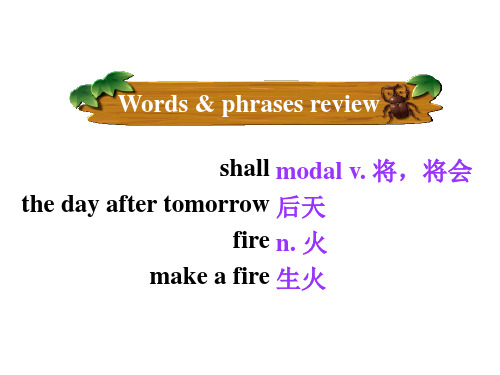
5. Tomorrow is mum’s birthday. _S_h_a_l_l we _h_a_v_e_ (have) a party for her, Dad?
6. Jim, what _s_h_a_ll_ I _b_u_y_ (buy) for the coming party?
7. — _I_s_ Tom _g_o_in_g__t_o_w__a_tc_h_ (watch) the basketball match the day after tomorrow?
一般将来时构成方式二: be going to+____________ 表示近期将要发生的动作或存在的状态, 以及计划、安排、打算要做的事。
We’re going to meet at the school gate. 我们打算在学校门口见面。
Look! It’s going to rain. 瞧!天快下雨了。
—Really? But it ____ a problem if he
works hard.
A. will be
B. doesn’t
C. won’t be
D. is
II. 用括号内所给动词的适当形式填空。
1. I _w_i_l_l _b_e (be) 14 years old next year. 2. Mr Li ___w__il_l_v_i_si_t_ (visit) Taiwan
5. Wow! New neighbours! I_’_ll_ _m_e_e_t_ them too!
1. Simon _____ here next month. A. isn’t working B. doesn’t working C. isn’t going to working D. won’t work
Unit 2 Grammar 一般将来时 解析版 (牛津译林版)

Unit 2 Neighbors Grammar3. 一Look at the black clouds! The clothes I hung out get wet! 一Don't worry. I collect them right away. A. will; willB. will; am going toC. are going to; willD. are going to; am going to 4. Bill in America tomorrow afternoon. A. arriveB. arrivesC. arrivedD. will arrive5. _Mr. Smith visit Beijing last week? 一No, but he Beijing with his son next time. A. Did; visits B. Did; will visit C. Does; visitsD. Will; will visit6. — I don't think Lucy will come today,she? —, she won't. She is ill and stays at home A. won ,t; NoB. will; NoC. won't; YesD. will; Yes7. There a sports meeting in our school next week.1. 一 you free tomorrow? 一Yes, I am.A. Are; going toB. Are; will 2. a meeting this evening. A. There is going to haveC. There will haveC. Are; will beD. Are; going to beB. There is going to beA. will haveB. is going to haveC. will beD. is8. —What ___________ n ext week?—Sorry, I have no idea.A. is he going to doB. is she doingC. do they doD. do you do9. There __________ an English speech contest.A. is going to haveB. is going to beC. are going to haveD. will have10. —What _________ y our cousin _________ in the future?—An artist.A. will; going to beB. are; going to beC. will; going toD. is; going to be11. —There _________ a football match in the sports centre next week.-Great!A. is going to haveB. will haveC. is going to beD. are going to be12. -When __________ we go there tomorrow?—I ________ meet you at 10 o'clock.A. do; willB. will; amC. shall; willD. shall; won,t13. There _________ an English party in our school tomorrow evening.A. haveB. will haveC. is going to haveD. is going to be14. Who _________ we _________ the museum with tomorrow?A. would; visitB. do; visitC. will; visitingD. shall; visit15. ——Please don't forget to take part in the sports meeting next Monday.A. I don,tB. I won,tC. I can'tD. I haven,t二、用所给单词的正确形式填空16.Mum, shall we(choice) a birthday present for my aunt?17.I(not go) to school tomorrow.18.Children(learn) at home in the future.19.They(have) a match next month.20.They(not move) away until tomorrow.21.Look at the clouds. There(be) a storm.22.Li Ming is 10 years old now, next year he (be) 11.23.There (be) football match in our school tomorrow afternoon.24.She(sing) Beijing opera at tomorrow's party.25.They are going to(visitor) Shanghai next year.三、完成句子26.我希望这些孩子们的梦想成真。
- 1、下载文档前请自行甄别文档内容的完整性,平台不提供额外的编辑、内容补充、找答案等附加服务。
- 2、"仅部分预览"的文档,不可在线预览部分如存在完整性等问题,可反馈申请退款(可完整预览的文档不适用该条件!)。
- 3、如文档侵犯您的权益,请联系客服反馈,我们会尽快为您处理(人工客服工作时间:9:00-18:30)。
7b Unit 2 Neighbours
Grammar
一.Teaching aims
1.Knowledge aims
✧To grasp Simple future tense with “Will” , “shall” and “be going to”.
2.Ability aims
✧To recognize and use …will‟, …shall‟ and …be going to‟ to talk about future
3.Emotion aims:
✧Learn to how to cooperate with others
二.Teaching emphasis
✧To recognize and use …will‟, …shall‟ and …be going to‟ to talk about futur e. 三.Teaching difficulties
✧To recognize and use …will‟, …shall‟ and …be going to‟ to talk about futur e. 四.Teaching method
✧Free talk,
✧Reading,saying ,practicing,
✧Teaching with pictures
五. Teaching aids
✧ A tape recorder
六.Teaching procedures
Step 1 Presentation
1.T: What after-school activities do you have today ?
S:… (go to the Reading Club/Music Club, play football/basketball/ tennis/ badminton, watch TV/matches/games , chat with friends)
2.T: These activities we will do today. we use …will‟ or …shall‟ when we talk about: Things that will happen. Plans that we are making now.
3.T: Work in pairs and talk about your plan after school, you can use the phrases on the blackboard.
I will/ shall…
He/She will…
4. T: Please look at the sentences on the blackboard and try to guess their meanings.
The bus will come soon. (将要发生的事)
I will play football after school. (计划要做的事)
5. T: Please work in pairs and talk about you will do next week.
Step 2 Practicing
1. T: Write some sentences on the blackboard.
I will buy a book tomorrow.
We will have a dinner in the restaurant next week.
He will watch a football match on TV.
2. T: Please look at table on page 2
3. We make positive and negative sentences using the simple future tense like this.:
T: Will you buy a book tomorrow?
S: Yes, I will./ No, I won’t.
3 T: Now please work in pairs, and change the sentences on the blackboard into question form.
4. T: Change the three sentences into negative form. T: Finish the exercises on page 23 part A
Step 3 Presenting
1.T: Please look at the table on page 24 part B.Change the four sentences into question form and negative form.
2. T: Please change these sentences into question form and negative form.
We are going to have a sports meeting next month.
Daniel is going to study computer this afternoon.
They are going to see the film this evening.
The students are going to play basketball after school.
It is going to rain tomorrow.
Step 4 Doing activities
1. T: Simon is telling Amy about his plan for a day out with his uncle‟s family. Complete their conversation . Please open your book to page24. Use the simple future tense of the verbs in brackets.
2. T: Please read the dialogue in pairs. I have some questions to ask you.
What will they bring?
Who will he plan for a day out with?
Will his uncle cook some food for them?
Will his aunt make a fire for them ?
2.Ss summary the content of this lesson.
3.Homework: 1)To remember the using of …will‟, …shall‟ and …be going to‟
2)To preview the “Integrated skills”Blackboard design
Teaching self-examination。
